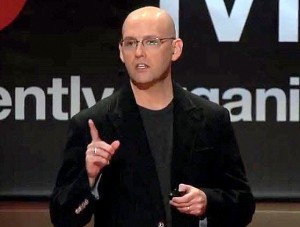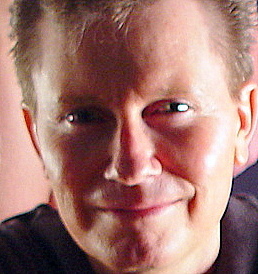Writing on the Ether

iStockphoto.com / Nikada
The digital train has so left the station. That's a Frankfurt railway stop, as a matter of fact. Fear and loathing, at home and abroad. International publishing-industry players met to hold meetings, attend conferences, drink heavily, and attend more conferences. They tweet-gasped at hotel wi-fi costing 19 euros per day and publishers warned of a digital "reckoning" headed toward them like the aforementioned train. In the States, our own special brand of American jitters led to complaints of "blog fatigue" and paranoia that ebooks might kill the footnote. Only occasionally did you hear a whisper reminding us all: It's the content, stupid.
"Struggling to make an impact"
The concept that seems to have struck the biggest chord is his not necessarily revolutionary, but it is timely—a reminder that publishers need to stop thinking of their readers as a broadcast audience. "Like our Facebook page!" he said, "Why don't you try liking their Facebook page, and following your loyal consumers' social media?"
Joel Naoum hears Mitch Joel speak at the TOC Frankfurt conference on Tuesday, finding "a mixed bag" at Tools of Change for Publishing
#bbpBox_123390892315910145 a { text-decoration:none; color:#0084B4; }#bbpBox_123390892315910145 a:hover { text-decoration:underline; }They missed a trick – if they called the event Talking in Circles - Tools of Change they could have been #tictoc #fbf11[image error]October 10, 2011 9:34 am via web Reply Retweet Favorite FBFoff
Daggers in Deutschland
He warned that publishers' grip on the business was "starting to change in favour of the author". He added: "Publishers are frightened to death of the e-book market, because they see the opportunity for authors, that they did not have before."
That's Philip Jones writing for TheBookseller.com about Trident agent Robert Gottlieb's comments at Publishers Launch Frankfurt, in Agents warn of e-book "reckoning"
#bbpBox_124102366684393472 a { text-decoration:none; color:#0084B4; }#bbpBox_124102366684393472 a:hover { text-decoration:underline; }I'm making T-shirts @about 20 hours ago via web Reply Retweet Favorite Brendan Borrell
Did we mention the content, stupid?
We need to communicate with customers to understand how, where and when they want to consume our content and respond accordingly. … One of the biggest challenges we've faced is deciding where to focus our time and resources as the digital landscape evolves.
Back in New York, Matt Mullin's Digital Book World profile of Andrea Fleck-Nisbet, digital director at Workman Publishing, neatly named many of the complexities publishers face as the industry hurtles toward e-reading.
#bbpBox_123869056389480448 a { text-decoration:none; color:#0084B4; }#bbpBox_123869056389480448 a:hover { text-decoration:underline; }Most important lesson from the Eugenides/Franzen/DFW article? Nobody looked good in photos in the 80s/90s.[image error]October 11, 2011 5:14 pm via web Reply Retweet Favorite Matt Mullin
Your most rabid fanboy might be your best expert
Because of shared obsessions among horse lovers, there are more horseshoers working today than a hundred years ago, in the age of cowboys. There are more blacksmiths making swords and chain mail armor this year than ever worked in the medieval past.
In a deft grace note to the global search for readership, Kevin Kelly reconfigures what once was a dream team on your staff. He directs you to a "hobby tribe" of consumers. Among them you'll find that Expertise now resides in fanatical customers
#bbpBox_123044079398432768 a { text-decoration:none; color:#0099B9; }#bbpBox_123044079398432768 a:hover { text-decoration:underline; }'Everyone's a diva these days' - @October 9, 2011 10:36 am via Twitter for iPhone Reply Retweet Favorite Timothy George
Your blog sommelier again: Writers yearning to be e-
I might be the biggest advocate of self-publishing you will ever meet. However, I don't believe it's for everyone. It is definitely for me, but that's because I write fast and all over the place. … Plus, I spent the last few years learning a heap about marketing, and believe I'm qualified to do the best possible job for myself.
A pairing, if you please. In his interview with Jane Friedman, The Evolving Model of the Entrepreneurial Novelist, Sean Platt talks (above) of his own comfort as both copywriter and fiction author, and his management of the business side of his model. While author Jami Gold (below) sees the tall order that self-marketing is to many creative types and asks Are Writers Without Business Sense Doomed?
Some people don't have the entrepreneurial spirit. That is a fact. Some people couldn't run a business to save their life. That is a fact. I don't want those facts to prevent talented writers from even trying to get themselves published. The push to force writers into a business model could make those without business savvy feel there's no place for them in the industry.
#bbpBox_123692246544551936 a { text-decoration:none; color:#0099ff; }#bbpBox_123692246544551936 a:hover { text-decoration:underline; }Ereader owners buy almost twice as many books as non-ereader owners. And read them. #tocffm[image error]October 11, 2011 5:31 am via Twitter for iPadReplyRetweetFavoriteJoel Naoum
But the backlists are back, baby
There's nothing like suddenly seeing an author who's been out of print for years have his whole catalog become available—and then watching people come in and buy all the books in one shot!
As Barnes & Noble's Liz Scheier makes exuberantly clear in her interview with Anne Kostick, one of the positive potentials of Digital Reading At the Intersection of Reading and Retail is redeploying the ones that got away.
#bbpBox_123759287544717315 a { text-decoration:none; color:#181706; }#bbpBox_123759287544717315 a:hover { text-decoration:underline; }Hulse: enhanced ebooks have a low title count but are the 10th bestselling category of books for Apple. #RDM2011[image error]October 11, 2011 9:58 am via web Reply Retweet Favorite Eoin Purcell
Small Demons with big e-vantages
Small Demons is a new way of indexing and organizing full-text content from books. Instead of showing text snippets, their combination of algorithms and human editors organizes book content around people, places and things mentioned in each book.
Michael Cader, writing in Publishers Marketplace, described the concept of this new entry, presented at Frankfurt, in A Glimpse of Small Demons at FBF: "So when you look up an individual title, you see all the actual people mentioned; a map of places cited; and a scrolling list of all kinds of objects found in the text." An e-boon for readers who long for lists. And for marketers? "Small Demons will share their datasets back with the publishers, providing a unique metadata set for publishers to use in targeted fashion."
#bbpBox_123451002086113280 a { text-decoration:none; color:#93A644; }#bbpBox_123451002086113280 a:hover { text-decoration:underline; }Guess who is going to be knee-deep in metadata following #fbf11 #publaunch[image error]October 10, 2011 1:33 pm via Twitter for iPad Reply Retweet Favorite Severn House
First we see in a screen darkly
The future sometimes lies in the past, too: in South Korea, there is the centuries-old tradition of Asian screen culture. Think of the beautifully painted analog, yet highly narrative, screens that have adorned homes in that region of the world for generations. Today, screens are being reinvented for the digital age. South Korean companies are developing a new generation of screens that hark back to years and years of paper imagery.
Jan Chipchase doesn't blink amid an "urban vocabulary of numerous, ever-present interactive screens" in Seoul on Display: How Global Screen Culture Will Affect Us. But as Graeme Neill writes that even the American Booksellers Association (ABA) also Plans Its Own E-book Reader, you do start to wonder if they won't all look like small demons to us soon.
#bbpBox_124143398478286848 a { text-decoration:none; color:#706238; }#bbpBox_124143398478286848 a:hover { text-decoration:underline; }Have America's readers been crying out for an ABA sponsored device?[image error]about 17 hours ago via TweetDeck Reply Retweet Favorite Don Linn
#bbpBox_124151855524745217 a { text-decoration:none; color:#009999; }#bbpBox_124151855524745217 a:hover { text-decoration:underline; }@about 17 hours ago via HootSuite Reply Retweet Favorite Brett Sandusky
Outside of a dog
Should footnotes fully disappear, I would grieve their loss. I do not find it disagreeable to bend my nose south and find further information where it lands. Surely the purpose of a book is not to present a methodically linear narrative, never wavering from its course, with no superfluous commentary set off by commas.
In what might be the week's most misguided essay, Alexandra Horowitz, author of Inside of a Dog, displays something approaching e-hysteria in Will the E-Book Kill the Footnote? Turning to DBW's resident user-experience expert, Anne Kostick, I found the quality of mercy sorely straining at the leash: "I truly believe that an e-book can offer a better experience for all those notes, sources, further readings, and tangents than a printed page, if we can just get past that page thing (see my column "Getting Beyond the Book Fetish"). This footnote mourning is really about something visual, not conceptual–the PAGE. The page was a paper construct, and page design (including footnotes) was invented and perfected (?) around that rectangle. Kill the page, I say! The page is fine for paper, but if we continue to restrict our digital thinking to paper models we'll miss all the potential of digital books. Maybe we should stop calling them books! Maybe I'll write about that." And we'll look forward to it, too, Ms. Kostick.
#bbpBox_124148693900337152 a { text-decoration:none; color:#2FC2EF; }#bbpBox_124148693900337152 a:hover { text-decoration:underline; }Apologies if I've missed any tweets or emails today. Connectivity at #fbf11 is shockingly bad. Just appalling.[image error]about 17 hours ago via Twitterrific Reply Retweet Favorite Dean Johnson
E-zy publish, e-zy errors
When readers discovered typos in The Starter hardcover edition, we were able to immediately distribute free corrected e-book versions to anyone who had purchased a copy. This goodwill created lifelong fans and could not have been possible through a third-party retailer.
That's Tay Nguyen in a guest post for Jane here. He's talking about his BackMyBook.com service for authors. The writer in question is bestseller Scott Sigler. The hardcover costs $34.95 (no extra charge for the typos). And being the kind, sweet-tempered soul I am, I immediately wrote to Tay, asking if in the age of such easy self-publication, he's not really running Back-My-Typo-Ridden-Overpriced-Self-Published-Book-With-Damage-Control.com?
Great sport that he is, Tay got right back to me: "Quality means exactly what you're referring to: typos, grammar, story continuity etc. I personally recommend that all my clients have their work professionally edited. Scott learned a hard lesson when he got a lot of reader feedback about the errors in his book. So he now has a professional freelance editor review all his work. The interesting observation is that he didn't lose any readers because of the errors. No one said 'I'll never buy your book again.' They complained, made fun of him, called him out on it for sure. In fact, he capitalized on it by running the MEA CULPA campaign."
Moral of this one? If you have to screw up at $35 a pop, you might want to have Tay getting your back. He says watching publishing go through its metamorphosis is "part like watching a train wreck in slow motion, part like watching a butterfly emerge from its cocoon."
#bbpBox_122337088006918144 a { text-decoration:none; color:#0084B4; }#bbpBox_122337088006918144 a:hover { text-decoration:underline; }not to mention the participants RT @October 7, 2011 11:46 am via TweetDeck Reply Retweet Favorite Brian O'Leary
You are getting very sleepy …
For some it's the negativity that comes with putting yourself out there. Some people have run out of ideas. Some people have taken a look at the cost/benefit and decided it wasn't worth it. And some just forget to post.
Agent-gone-CNET-digital-guy Nathan Bransford chose a cracking good Breugel detail to illustrate his question Is Blog Fatigue on the Rise? mentioning author Jon Konrath and others who are going on a blog hiatus.
#bbpBox_123028022659002369 a { text-decoration:none; color:#0084B4; }#bbpBox_123028022659002369 a:hover { text-decoration:underline; }I always carry dice with me wherever I go. That's how I roll.[image error]October 9, 2011 9:32 am via web Reply Retweet Favorite JA Konrath
How many pictures are worth the right word?
Icons are symbols supplied with most mind mapping software programs. You can use icons as a type of visual shorthand to indicate topic category, importance, or sequence. You can also use icons to show progress completing a task.
Roger C. Parker makes a good a case for How to Get Started Mind Mapping Your Book (and everything else). What I'd like to see is some research that helps us understand why it helps true word people, such as writers, to use what Parker calls "a form of visual thinking."
#bbpBox_124246547004268544 a { text-decoration:none; color:#0084B4; }#bbpBox_124246547004268544 a:hover { text-decoration:underline; }Bowker launches survey of eBook growth and consumer attitudes on four continents No Shelf Required @about 10 hours ago via TweetDeck Reply Retweet Favorite Kevin Cronin
When form follows function very well
Because, let's be frank, we might as well just fill in all that ridiculous content with beautiful white space.
Can you integrate what you do with who you are as well as Ben Cook has done? If so, I salute you, as I do him. Check out his Venn-diagrammatic BenCookDesign About Me page.
#bbpBox_124120546043633664 a { text-decoration:none; color:#93A644; }#bbpBox_124120546043633664 a:hover { text-decoration:underline; }Interesting and cute. Only 300 copies. RT @about 19 hours ago via HootSuite Reply Retweet Favorite Dominique Raccah
A critic in the hen house
(Hearing executives like Mark Zuckerberg) is like being in the presence of half-Ghandi, half-Stalin. They have no sense of moral framework. They don't care as long as they're giving you the tools and you use them.
As Paid Content's Robert Andrews reports from Bristol's Marshall McLuhan centennial seminars, even a lot of self-styled McLuhan fans aren't necessarily clear on the importance of good nay-saying: Where Are the Voices to Transcend Techno-Jollity?
#bbpBox_124214151466860546 a { text-decoration:none; color:#69808a; }#bbpBox_124214151466860546 a:hover { text-decoration:underline; }Oh yay, air traffic controllers in Germany decided NOT to go on strike. All the Frankfurt folk must be relieved. #FBF11[image error]about 12 hours ago via web Reply Retweet Favorite Robin Lenz

Brad Meltzer TEDxTalks
"My name is Brad Meltzer. And this novel I wrote, it's for you."
The first person who ever told me I could write? She had no idea of her impact, no concept of her legacy.
As with Andrews' voices of techno-jollity, maybe you've quietly felt some unease around those what Hamilton Nolan called the "cult-like lachrymosity" that surrounded the news of Steve Jobs' death. This might help. Here's someone asking the far more important question: what about your legacy? Spend 16 minutes with the author of The Inner Circle, my pal Brad, as he talks over what it might mean simply to thank people like his teacher, Ms. Spicer, in How To Write Your Own Obituary. "You are on the mountaintop every single day … it is all within your power."
Porter Anderson is a Fellow with the National Critics Institute, and a senior producer and consultant formerly with the United Nations World Food Programme in Rome and INDEX: Design to Improve Life in Copenhagen. As a journalist, he has worked with media including CNN, the Village Voice, and the Dallas Times Herald. He's based in Tampa.

Jane Friedman
- Jane Friedman's profile
- 1882 followers




